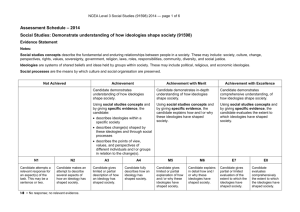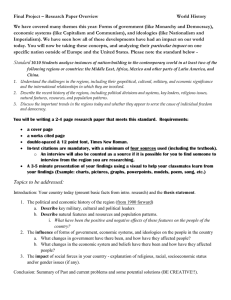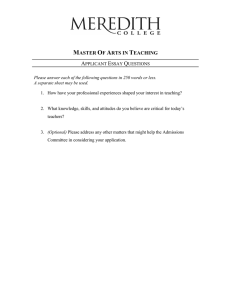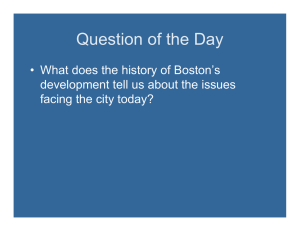(116KB)
advertisement
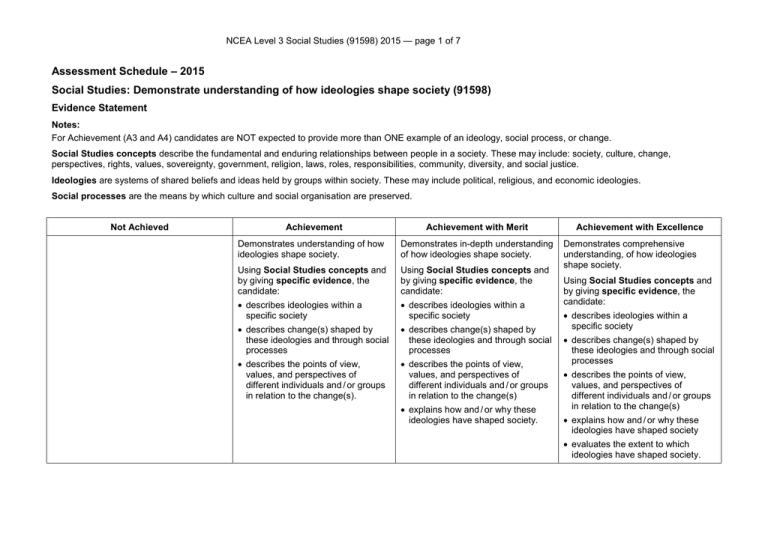
NCEA Level 3 Social Studies (91598) 2015 — page 1 of 7 Assessment Schedule – 2015 Social Studies: Demonstrate understanding of how ideologies shape society (91598) Evidence Statement Notes: For Achievement (A3 and A4) candidates are NOT expected to provide more than ONE example of an ideology, social process, or change. Social Studies concepts describe the fundamental and enduring relationships between people in a society. These may include: society, culture, change, perspectives, rights, values, sovereignty, government, religion, laws, roles, responsibilities, community, diversity, and social justice. Ideologies are systems of shared beliefs and ideas held by groups within society. These may include political, religious, and economic ideologies. Social processes are the means by which culture and social organisation are preserved. Not Achieved Achievement Achievement with Merit Demonstrates understanding of how ideologies shape society. Demonstrates in-depth understanding of how ideologies shape society. Using Social Studies concepts and by giving specific evidence, the candidate: Using Social Studies concepts and by giving specific evidence, the candidate: describes ideologies within a specific society describes ideologies within a specific society describes change(s) shaped by these ideologies and through social processes describes change(s) shaped by these ideologies and through social processes describes the points of view, values, and perspectives of different individuals and / or groups in relation to the change(s). describes the points of view, values, and perspectives of different individuals and / or groups in relation to the change(s) explains how and / or why these ideologies have shaped society. Achievement with Excellence Demonstrates comprehensive understanding, of how ideologies shape society. Using Social Studies concepts and by giving specific evidence, the candidate: describes ideologies within a specific society describes change(s) shaped by these ideologies and through social processes describes the points of view, values, and perspectives of different individuals and / or groups in relation to the change(s) explains how and / or why these ideologies have shaped society evaluates the extent to which ideologies have shaped society. NCEA Level 3 Social Studies (91598) 2015 — page 2 of 7 N1 Attempts a relevant response for an aspect(s) of the task. This may be a sentence or two. N2 Makes an attempt to describe several aspects of how an ideology has shaped society. N0/ = No response; no relevant evidence. A3 Gives limited or partial description of how an ideology has shaped society. A4 Fully describes how an ideology has shaped society. M5 Gives limited or partial explanation of how and / or why these ideologies have shaped society. M6 Explains in detail how and / or why these ideologies have shaped society. E7 Gives partial or limited evaluation of the extent to which the ideologies have shaped society. E8 Evaluates comprehensively the extent to which the ideologies have shaped society. NCEA Level 3 Social Studies (91598) 2015 — page 3 of 7 Examples of evidence for answers Achievement Achievement with Merit Achievement with Excellence Describing an ideology within a specific society could include: Secularism is an ideology that involves two basic propositions. The first is the strict separation of the state from religious institutions. The second is that people of different religions and beliefs are equal before the law. The separation of religion and state is the foundation of secularism. It ensures that religious groups don’t interfere in affairs of state, and makes sure the state doesn’t interfere in religious affairs. Explaining how and / or why an ideology has shaped society could include: Secularism as an ideology has shaped French society because it underpins French legislation to restrict religious expressions, even at the risk of international condemnation. This is demonstrated through the importance the government and the majority of France’s citizens place on removing the influence of religion from any affairs of state. The insistence on schools as religion-free zones goes to the heart of the French idea of citizenship. The French state cannot allow any religious attempts to proselytise in public buildings – least of all schools, where the citizens of tomorrow are being taught. Evaluating the extent to which the ideology has shaped society could include: The strengths of the impact of secularism on French society is the ideology’s focus on equality and the desire to eliminate or restrict all things that might lead to prejudice or conflict amongst citizens. Secular France fully supports the freedom of individuals to worship or believe as they feel appropriate, without any interference from the State. However, hand in hand with this strength is the requirement to restrict visible signs of any religious affiliation to a citizen’s private life. Citizens cannot wear these items in public, in case they should influence others or create conflict. Many argue that rather than protecting human rights in France, secularism in this instance is violating the individual right to freedom of expression. Secularism seeks to ensure and protect freedom of religious belief and practice for all citizens. It is about ensuring that the freedoms of thought and conscience apply equally to all believers and nonbelievers alike. Secularism ensures that the right of individuals to freedom of religion is always balanced by the right to be free from religion. Those who follow the secular ideology believe that as citizens share hospitals, schools, the police, and the services of local authorities, it is essential that these public services are secular at the point of use, so that no one is disadvantaged or denied access on grounds of religious belief (or non-belief). They believe that all state-funded schools should be nonreligious in character, with children being educated together, regardless of their parents' religion. Secularism also protects free speech and expression, believing that just as religious people have the right to express their beliefs publicly, so do those who oppose or question those beliefs. France is not the only Western country to insist on the separation of church and state, but it does so more militantly than any other. Secularism is the closest thing the French have to a state religion. It underpinned the French Revolution, and has been a basic tenet of the country’s progressive thought since the 18th century, including the country’s 1905 law enforcing a strict separation of church and state. To this day, anything that hints at official recognition Secularist belief in France is directly responsible for the government’s 2004 legislation banning religious symbols in schools, the 2011 ban of wearing head coverings in public, and the 2013 secularism school charter. Not only has secularism forced a change in what citizens are allowed to wear in public, and within schools particularly, France’s unwavering stance on secularism has also led to widespread condemnation and protest – even from non-Muslim citizens who hold to a modern version of secularism that is more supportive of personal freedoms such as the wearing of religious items in public. In July 2013, France was shaken by two nights of rioting and car-burning in the Paris suburb of Trappes at the weekend, after a police identity check on a French woman wearing a niqab, or full-face Muslim veil, raised questions about Nicolas Sarkozy's controversial 2011 law banning the niqab from public places. This shows the growing dissatisfaction that many French citizens have with the restrictions being placed on them. Even before the Trappes riots, tension had been rising for months in France over the broader issue of While legislation over the last decade was intended to reduce the influence of Christianity on French public life, Islam is increasingly influential in France. The Muslim population of France reached an estimated 6.5 million in 2013. Although France is prohibited by law from collecting official statistics about the race or religion of its citizens, this estimate would imply that the Muslim population of France is now approximately 10% of the country’s total population of around 66 million. In real terms, France has the largest Muslim population in the European Union. Thus, laws banning the wearing of the hijab or burqa affect a significant and growing number of French citizens, and also draw condemnation from the Islamic community, both in and outside France. Tension has been heightened further by recent violent attacks on women in headscarves in Argenteuil, a Paris suburb, where a pregnant woman who was attacked, miscarried days later. Hundreds of protesters at a street demonstration in Argenteuil last month condemned the toxic nature of the debate around the veil, weeks before the Trappes riots. NCEA Level 3 Social Studies (91598) 2015 — page 4 of 7 of a religion – such as allowing Islamic headscarves in schools – is anathema to many French people. The French Revolution brought about a head-on clash between church and state. Napoleon Bonaparte reached a peace of sorts with the church, which was brought under state tutelage but left alone as long as it confined itself to spiritual matters. The arrangement, known as the Concordat, lasted a century. In 1905, amid renewed anti-clerical militancy, the Third Republic decreed the separation of church and state. The Republic has always recognised individuals, rather than groups – a French citizen owes allegiance to the nation, and has no officially sanctioned ethnic or religious identity. The law of separation meant strict official neutrality in religious affairs. Describing the change(s) shaped by an ideology and through social processes could include: “La laicité” – French for secularism – commands massive public support in France. This ideology has shaped change in French society through government legislation. In 2004 the government legislated a ban on the wearing of religious clothing or symbols in school. This was followed in late 2013 when France unveiled its much-awaited “secularism charter” for schools, which bans pupils from boycotting classes for religious or political reasons and promotes “total respect for the freedom of conscience”. The charter lists 15 secular principles and will have pride of place in every state school in France.The 2004 French law on “secularity and conspicuous religious symbols in schools” bans wearing conspicuous religious symbols and clothing that indicate a student’s religious affiliation in French public primary and secondary schools. Signed into law on 15 March 2004, it came into effect on 2 September 2004, at the beginning of the new school year. While the law does not mention any particular symbol, and thus bans all Christian, Muslim, Jewish and Sikh symbols such as crosses, veils, skullcaps, turbans, and other signs, it is considered by many to specifically target the wearing of headscarves (a Muslim headscarves, including the simple hijab. The headscarf is still a major political issue in François Hollande’s France. MPs are now considering passing a new, tighter law limiting the professions in which headscarves can be worn, including banning carers in private nurseries from wearing it in front of young children. A new protest group, “Mamans Toutes Egales”, or “Mothers All Equal”, has developed as a result. Based in Montreuil, outside Paris, it has blocked school coaches, boycotted outings, and staged street demonstrations in protest at the growing number of mothers in headscarves being barred from school trips. “This is an attack on freedom and democracy in state schools. They seem to want to wipe Muslim women off the landscape,” says Youssra, 36. Islamophobic attacks in France more than doubled between 2011 and 2012 – with women in headscarves the principal target, accounting for 77% of victims of physical or verbal attacks, according to the French Collective Against Islamophobia. After the attacks on veiled women in Argenteuil, the French Muslim Council warned: “Attacks on women in headscarves multiply around the time of each debate about the wearing of the Muslim veil.” Differing views within France on the degree of secularism and necessity of legislation banning religious symbols and clothing has also led to a rift in French society. Is it possible that the French State’s focus on secularism will destroy the reality of the values that underpin its national identity – liberty, equality, and fraternity? NCEA Level 3 Social Studies (91598) 2015 — page 5 of 7 khimar, considered by most Muslims to be an obligatory article of faith as part of hijab “modesty”) by Muslim schoolgirls. The French parliament house speaker, Jean-Louis Debré, said the law was a “clear affirmation that public school is a place for learning, not for militant activity or proselytism”. In practice, the 2013 charter means that teaching staff must never give any indication of their religious (or political) convictions during lessons, and that pupils cannot use their faith as a reason to challenge the content of the national curriculum, the manner of teaching, or the rules of the school. The notion of the “Ecole laique” (secular school) as one of the cornerstones of the Republic and a guarantee of the universal right to the freedom of expression and thought is one that is cherished by France’s intellectual elite. Outside minority faith communities, it also enjoys strong support among the population. “To me it's not right, people coming to school with religious symbols,” said 16-year-old Arthur Rivelois outside his Parisian Lycee. “Their faith is their business, it's nothing to do with the rest of us.” The legislation has also caused much anguish among France's 30,000 Sikhs, whose male children are required by their faith to cover their hair from an early age. Many primary schools have continued to allow younger Sikh boys to wear the Rumal, a handkerchief-type covering, but turbans are banned – a situation that effectively results in many Sikh teenagers giving up school earlier than they otherwise would. Many believe this is actively denying people their human right to education. Describing the points of view, values, and perspectives of different individuals and / or groups in relation to the changes could include: Unveiling the document at a special ceremony at a school near Paris, Vincent Peillon, the education minister, said: “Nobody can say that due to my opinions I'm not going to this or that class or sport. The Republic recognises equality between girls and boys. There is separation of the private and public NCEA Level 3 Social Studies (91598) 2015 — page 6 of 7 sphere. Secularity is about the equality of everyone in the Republic. There are those who think it is all about banning things. In fact it was what allows us to live together freely.” Peillon has this point of view because he values equality and fraternity amongst French citizens, and believes that removal of religious symbolism from public spheres is key to this happening. His point of view and values are shaped by his secular perspective. “Nobody can cite their religious appearance to refuse to obey rules applicable in our school”, states Article 13 of the charter. This article was criticised by several Muslim leaders. Dalil Boubakeur, new president of the French Council for the Muslim Faith, said: “We can very well see who this charter is addressing. I fear, as was the case in the 2004 law, seeing Muslims of France stigmatised as a whole and that this ban on religious symbols will be perceived as too brutal”. He believes this because he values both Muslim beliefs and French beliefs of freedom and equality. However, he believes that these two things do not have to work against each other. This is shaped by his social justice perspective. Abdallah Zekri, president of the Observatory on Islamophobia, said he felt “targeted” by the charter. A survey published in the Paris-based newspaper Le Monde on January 24 found that 74% of French citizens view Islam as “intolerant” and “incompatible” with French values, and that the vast majority of French citizens say they are in favor of the burqa ban, which came into force in April 2011. The law was enacted amid rising frustration that the country's Muslim population is not integrating into French society. The poll found that 86% of French people are in favor of introducing legislation that would ban “all signs of religious or political affiliation” in public and private schools and nurseries. This view is shaped by a French Republican or secularist perspective. NCEA Level 3 Social Studies (91598) 2015 — page 7 of 7 Cut Scores Not Achieved Achievement Achievement with Merit Achievement with Excellence 0–2 3–4 5–6 7–8
